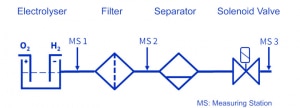Measuring the quality of hydrogen is often, unjustifiably, viewed as time-consuming and expensive. Rather, it helps to better understand and improve technical processes. The path to regular quality measurements of hydrogen is being intensely debated as we speak.
Fuel cell manufacturers demand from hydrogen producers that the gas meets very high purity requirements to prevent damage to their fuel cells. In turn, producers of hydrogen are calling for more robust fuel cell systems to be able to decrease purity and cut costs.
Current discourse often ignores the reason why quality assurance is important to the entire industry. It serves to engender trust in the technology as an increasing number of hydrogen systems are becoming available for sale. Thus, measurements should first and foremost benefit the users of these systems.
Why measure?
More and more fuel cell vehicles are being brought to market these days. A failure of these first consumer fuel cell vehicles could severely tarnish the reputation of an emerging hydrogen economy. This alone should be reason enough to implement measures to ensure that the hydrogen is of high quality.
Low-quality gas could damage not only fuel cells but also other components in the process chain. For example, frozen impurities could put seals and valve heads at risk. Storage systems, such as metal hydride tanks, could suffer as well.
To prevent damage, it is important to conduct regular quality inspections along the supply chain. This is equally true for traditional fuels: Even today, they are still tested in regular intervals. Leading oil corporations have said that they test their fuels for harmful substances at least 6,000 times a year. These inspections cover everything from production, transport and distribution to refueling at gas stations and ensure that the technical processes involved in supply chain management are highly efficient and cost-effective.
…
read more in H2-international April 2019

























Dear Sven
I find your free e-magazine excellent and full of valuable information for the emerging Hydrogen economies around the world. However, the article “Measuring up to standards” (June 3rd 2019) on testing the quality of Fuel Cell Vehicle (FCV) Hydrogen obliges me to write a somewhat critical comment.
Can you please check and advise (roughly) how many commercial laboratories in Europe carry out the full set of analyses required to meet the SAE / ISO standard for FCV Hydrogen fuel quality? You claim that in order to prevent damage to fuel cells that “it’s important to conduct regular quality inspections along the supply chain”.
In the USA to my knowledge, there are only two commercial laboratories that can carry out the FULL set of tests required to certify a H2 sample as meeting the SAE / ISO standard (SAE J2719 and ISO 14687). Some of the stringent measurements required to meet the standard are so low (parts per billion) that they’re at the lowest detectable limit of current ASTM test methods available for certain “contaminants”.
Could I suggest you or one of your associates investigates and explains the commercial relationships between Fuel Cell Vehicle manufacturers (Toyota Mirai etc) whose vehicles receive the H2 at the bowser and who provide customer vehicle warranties, and the Suppliers of Hydrogen (including from in-situ electrolysers).
There must be agreements of some kind on quality control for FCV H2 supply which DOES NOT include actually testing of samples of Hydrogen along the supply chain. The FCV H2 supply chain is very different to petrol and cannot be compared to petroleum industry fuel quality control.
This subject is I admit extremely technical and not necessarily the style of article your magazine publishes however it’s certainly a worthwhile subject which I’m sure your readers would appreciate knowing more about. Best regards. Costa